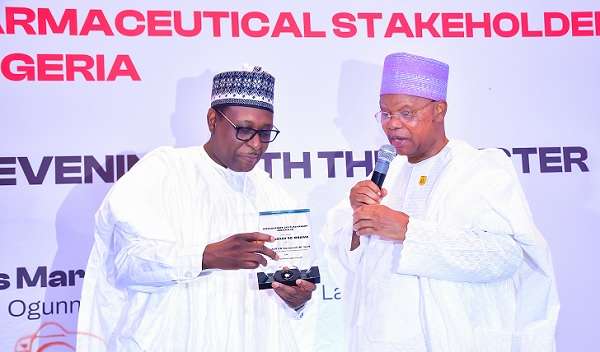
In no distant future, the fortunes of the Nigerian pharma industry will surpass expectations and become the darling of the global market, with the level and quality of consultation that has been established between the federal government and the pharmaceutical industry leadership in the country. Going by the assurances of the Minister for Health and Social Welfare, Prof. Muhammad Ali Pate, during a consultative meeting with the Nigerian pharmaceutical community, in Lagos on Wednesday, issues such as the rising cost of pharmaceuticals and the shortage of APIs would soon be relegated to the dustbin of history. This is owing to the Federal Government’s commitment towards collaborating with the pharmaceutical sector, to usher in a new dawn of self-sufficiency in local pharma manufacturing and API production. In this interview with Pharmanewsonline, the minister enumerates the reasons Nigerians should rest assured of brighter days ahead in the health sector. Excerpts:
What changes do we expect after this consultative forum?
Today, we had a great evening in the consultative forum with stakeholders in the pharmaceutical industry supporting the presidential initiative to unlock the healthcare value chain and we are very grateful to the host, the industry players who have been playing a major role in the pharmaceutical industry in Nigeria. As part of the President’s Renewed Hope agenda, the health and welfare of Nigerians are key.
Local pharmaceutical manufacturing is something we are pursuing aggressively – one that would ensure that the industry thrives for Nigerians to have access to affordable medicines to improve the health of the population of this country. This forum is just the beginning. We would be having a second forum in three months’ time.
As we know, the president has granted that an executive order be developed which would begin to reduce the barriers to local manufacturing and enable the industry to thrive. We expect this development to eventually reduce the cost of pharmaceuticals.
The rising cost of pharmaceuticals is a major issue that bothers all of us in government. It is not just a Nigerian issue. It is a global issue and in the context of our administration, we are very focused on what we can do to reduce the burden on Nigerians, especially the poorest and most vulnerable. So, this is a very fruitful consultation that we have had with the industry.
What is the Federal Government doing to curb the exit of pharmaceutical giants from Nigeria?
We have a very vibrant and working pharmaceutical industry and we have many that are beginning to show interest to come into our economy. In the last three months, we have had at least three major players exploring the opportunity of coming to manufacture in Nigeria.
We do hope that many others would come in and that our local industry would thrive. It is not that easy at this point but we know that this cloud will pass and Nigeria will rise again. So, we are very confident that the industry would weather the difficulties of today.
Stakeholders raised concerns about the introduction of VAT on imported raw materials and other pharmaceutical products. What is the Federal Government doing in this regard?
If you listened carefully, this is a consultative forum and we have listened to all those concerns. This is a listening government and we are taking actions to see how we can reduce the burden. At the end of the day, our objective is to see that our local manufacturers are thriving.
Players in the sector have said they require six hundred billion to commence local APIs manufacturing. What is your take on this?
The issue of APIs that are being imported is one that has been going on for decades. It did not start in the last six months or in the last one year. We are now beginning to tackle it head-on. As we know, even some of the advanced economies get their APIs from one or two countries but Nigeria is looking at how it can diversify the sources of the APIs and it would take time. In one year, you cannot solve what has not been done for decades.
We are very committed and the President has given his clear direction on the matter. He has urged us to encourage the private sector to be able to provide what is need by Nigerians and that our regulatory standards are at the level that can guarantee the quality of what is being produced in Nigeria. We are committed to doing this and this consultative forum is a great way to start. We would have a follow up in three months with the industry and remember, this is the first time government and the pharmaceutical industry are having this kind of dialogue and I can assure you that we are listening in a very constructive manner.
We have received very good suggestions on what needs to be done. The President himself has directed the Attorney-General to develop an executive order. Nigerians should just be assured that President Tinubu is listening and concerned about issues affecting their welfare and we are committed to deliver on these by working across sectors – between the public and the private sector, the federal government and the industry. This meeting today is a reflection of that commitment.
What is being done about the rising cost of basic pharmaceuticals like paracetamol?
The wider macroeconomics of this country is challenged and this has occurred over several years. We are now trying to see how we can reverse the trend. There are things that are influencing what we are experiencing beyond what the health sector has control over.
In the context of this administration, in 2024, we have already appropriated resources to improve procurement mechanisms for critical medicines that would bring succor to the poorest and most vulnerable Nigerians. The price of commodities and other things beyond pharmaceuticals have also risen and it is not just a Nigerian issue.
If you look at the media as a journalist, the cost of pharmaceuticals has also risen in the European, Americana and British markets. The cost of pharmaceuticals globally has been skyrocketing in the last few months because there is shortage of the APIs.
So, as they are also struggling to resolve their issues, we have put in place mechanisms to improve procurement and also engage with the local manufacturers so that we would begin find solutions from many angles, one of which is the executive order that is coming very soon.










